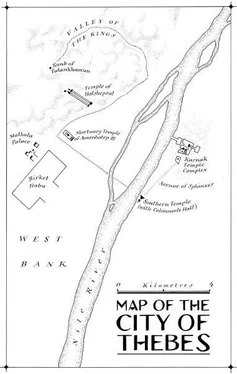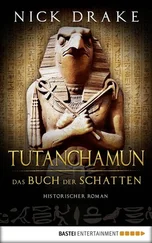Nick Drake - Tutankhamun - The Book of Shadows
Здесь есть возможность читать онлайн «Nick Drake - Tutankhamun - The Book of Shadows» весь текст электронной книги совершенно бесплатно (целиком полную версию без сокращений). В некоторых случаях можно слушать аудио, скачать через торрент в формате fb2 и присутствует краткое содержание. Жанр: Исторический детектив, на английском языке. Описание произведения, (предисловие) а так же отзывы посетителей доступны на портале библиотеки ЛибКат.
- Название:Tutankhamun: The Book of Shadows
- Автор:
- Жанр:
- Год:неизвестен
- ISBN:нет данных
- Рейтинг книги:4 / 5. Голосов: 1
-
Избранное:Добавить в избранное
- Отзывы:
-
Ваша оценка:
- 80
- 1
- 2
- 3
- 4
- 5
Tutankhamun: The Book of Shadows: краткое содержание, описание и аннотация
Предлагаем к чтению аннотацию, описание, краткое содержание или предисловие (зависит от того, что написал сам автор книги «Tutankhamun: The Book of Shadows»). Если вы не нашли необходимую информацию о книге — напишите в комментариях, мы постараемся отыскать её.
Tutankhamun: The Book of Shadows — читать онлайн бесплатно полную книгу (весь текст) целиком
Ниже представлен текст книги, разбитый по страницам. Система сохранения места последней прочитанной страницы, позволяет с удобством читать онлайн бесплатно книгу «Tutankhamun: The Book of Shadows», без необходимости каждый раз заново искать на чём Вы остановились. Поставьте закладку, и сможете в любой момент перейти на страницу, на которой закончили чтение.
Интервал:
Закладка:
‘It is an honour to receive your majesty again in Memphis,’ said the general formally.
Tutankhamun smiled back, with a slightly cautious affection.
‘This city holds many good memories for me. You were a good and trusted friend to me here.’
The King looked delicate and slight next to the confident, well-built, older general. Those attending this dialogue, including the young secretary, waited in silence for Horemheb to continue.
‘I am glad you thought so. I was then privileged with the titles of deputy and military tutor. I remember well it was me you consulted on many matters of state and policy, and to me you would listen. It was once said, I could pacify the palace …when no one else could do so.’
He smiled without opening his mouth. The King smiled back, still more cautiously. He had sensed the undercurrent of hostility in Horemheb’s tone.
‘Alas, time passes. It now all seems so long ago…’
‘Then you were a boy. Now, I salute the King of the Two Lands. All we are, and all we have, is held in your royal power.’ And he bowed curtly.
‘We hold your affection in high esteem. We treasure it. We wish to honour all your works and deeds…’
The King let the sentence die away.
‘Here in Memphis, you will have noticed many changes,’ continued Horemheb, on another tack.
‘We hear you have many projects. We hear you are building a great new tomb for yourself, in the Saqqara necropolis,’ replied the King.
‘It is just a small, private tomb. Its construction and decoration amuses my rare private hours. It would be an honour to show it to you. The wall carvings are very fine.’
He smiled, wryly, as if at a little private joke, but his eyes were distant.
‘What do these carvings depict? The General Horemheb’s many military triumphs?’
‘The glorious campaigns in Nubia, led in triumph by your highness, are described there,’ replied the general.
‘I remember your glorious and triumphant direction of those campaigns in my name.’
‘Perhaps his majesty forgets his own distinguished contribution to their glory.’
‘I forget nothing,’ replied the King, directly.
There was a little silence in which Horemheb considered his response. There was something of the crocodile about him; his eyes above the surface, ever watchful, the rest of him concealed in the darkness below.
‘The King must be hungry and thirsty after his journey. He must eat well before he departs on his royal hunting expedition,’ he said, almost in the tone in which one would address a child. Then he clapped his hands, and instantly servants appeared with exquisite food on beautiful pottery dishes. They were respectfully offered on trays to the King, but he ignored them, and I realized I had not seen him eat or drink anything here.
Horemheb issued a peremptory order to the young officer. He disappeared, and we waited, neither Horemheb nor the King speaking to break the stalemate of silence. I wondered what Tutankhamun thought now of this man whom he had called his good father.
The officer returned, leading a high-status Syrian captive, his hands tied harshly behind his back, forcing him to bow in the traditional posture of the captured enemy. The man, who was in a poor state, his head crudely shaven and marked with vicious cuts, his limbs spindle-thin, stared at the floor with the rage of humiliation in his proud eyes. The officer took one of the dishes of food, and offered it to Horemheb, who forced open the jaws of the captive, as if he were an animal. The man was afraid, but he knew he had no choice; and he was starving in any case. He chewed cautiously, and then fearfully swallowed. We all waited to see whether he would double up and collapse from the effects of poison, or just from bad cooking. Of course, no such thing occurred, but Horemheb made him test every dish being offered. Finally he was led away, where he was made to stand facing the wall so that the King could see he suffered from no slow-acting poisons. But the effect of this strange performance was astonishing, for Horemheb made it feel as if the King himself could be that force-fed prisoner.
‘We are well aware of the perils and outright threats that the King has suffered, even in his own palace. Now you may, if you wish, eat from our banquet in absolute confidence,’ said the general, intently.
And everyone watched as the King carefully took a tiny portion of duck meat, ate it slowly, smiled and said: ‘Our appetite is satisfied.’
This strange little episode was, as it turned out, a minor skirmish preparing the way for the speeches that followed. As Horemheb stepped up on to a dais the whole chamber fell quickly to a hush. Mouthfuls of food were swallowed, greasy fingers washed clean in fingerbowls, and the servants vanished. The general stared out at the gathering. His handsome face, which seemed never to have indulged in the luxury of self-expression, assumed the lineaments of authority: a certain jut of the chin, and a composed, imperturbable and superior regard. He waited for absolute silence. Then he spoke, not fluently, but with force and conviction, punctuated with assertive gestures that were somehow rehearsed and awkward, and an occasional, almost mocking humour which I sensed could turn, in an instant, into viciousness. He formally welcomed the King and his retinue, and pledged all assistance from the city’s resources-which he enumerated at great length, just to remind us all of the powers and riches he could call upon-to his security and pleasure during what he called ‘this brief visitation’ on the way to the royal hunt. He managed to make it sound like a complaint rather than a compliment, and I watched the King’s face for his reaction. But he continued to stare ahead.
Then Horemheb continued: ‘At this time of heightened insecurity in the Two Lands, the army remains the force of order and justice, defending the great, eternal values and the traditions of our kingdom. We are successfully prosecuting our territorial interests in the lands of Amurru. Wars are a necessity, to sustain our pre-eminence and authority in the world, and to extend our boundaries. Winning those wars is my responsibility. The perfection of order and justice which our state exemplifies must be maintained and supported, and therefore we petition the King and his advisers to release further funds for this great aim, to extend the army’s divisions, and to ensure our glorious success, which will certainly richly repay the investment we now formally request.’
He paused. I looked around the great chamber. Everyone was paying full attention now, waiting for the King to respond. The audience gave him absolute silence, so as to hear every quiet word.
‘War is the state of mankind,’ he began, eventually. ‘It is a great and noble cause. We support and maintain the army of the Two Lands. We acclaim its general. His aim is our aim: the triumph of our order through the rightful exercise of power. We have maintained our support throughout these long years of battle, with confident belief in our general, who continues to assure us of a successful conclusion to these wars. But of course there are many demands upon our great treasury. It is the responsibility of the King and his advisers to balance these many, and sometimes conflicting, requests. Maat is the divine order of the universe, but in our cities and our lands that divine order is maintained by proper finance, according to the contributions required of everyone. Therefore we ask the general of the Two Lands to explain and justify, before all of us assembled here, why the army now requests further subsidy, given our already lavish support.’
Horemheb stepped forward, as if prepared for this move.
‘Our request is not predicated only upon the successful conclusion to our foreign wars. Its purpose is to reinforce the presence and the power of the army at home. For it has become clear there are disruptive forces at work within our own society. Indeed, from all reports, these forces have found their way to the very heart not just of our temples and our offices of government, but even of our royal palace itself. We wonder how such acts of treachery can possibly have been permitted to come to pass.’
Читать дальшеИнтервал:
Закладка:
Похожие книги на «Tutankhamun: The Book of Shadows»
Представляем Вашему вниманию похожие книги на «Tutankhamun: The Book of Shadows» списком для выбора. Мы отобрали схожую по названию и смыслу литературу в надежде предоставить читателям больше вариантов отыскать новые, интересные, ещё непрочитанные произведения.
Обсуждение, отзывы о книге «Tutankhamun: The Book of Shadows» и просто собственные мнения читателей. Оставьте ваши комментарии, напишите, что Вы думаете о произведении, его смысле или главных героях. Укажите что конкретно понравилось, а что нет, и почему Вы так считаете.











